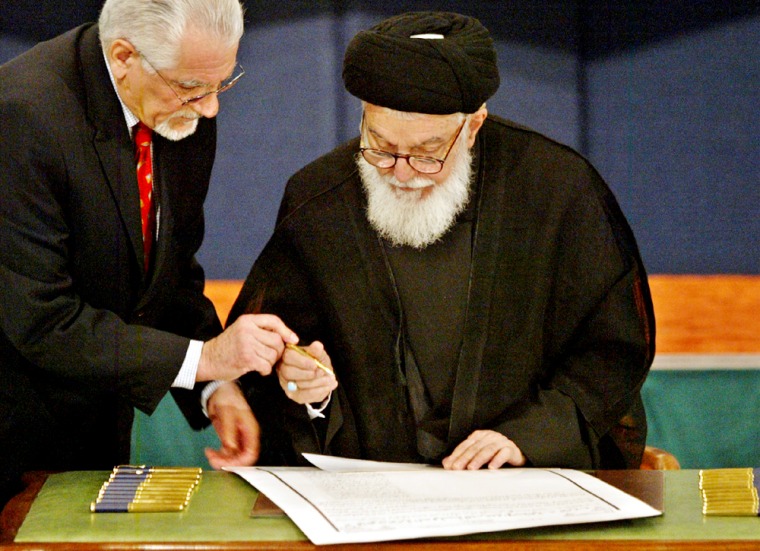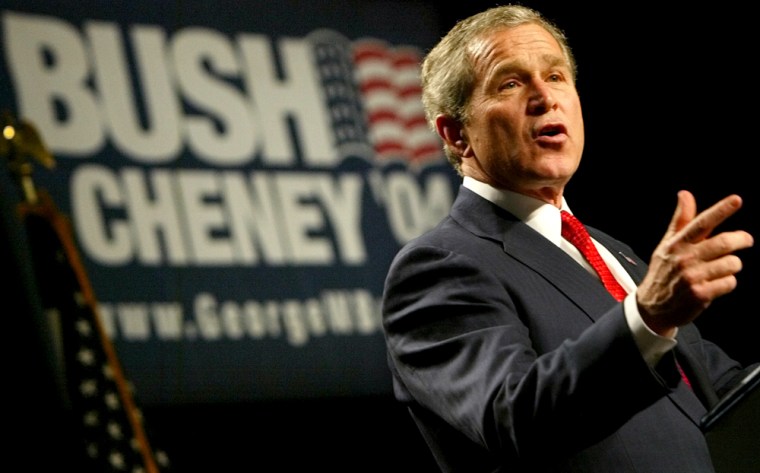One year after the president took the nation to war, the country is once again settled in for a general election campaign that will decide whether George W. Bush will serve four more years in the White House.
The timing is a coincidence, of course. But on the night of March 19, 2003, when the president announced the first strike of Operation Iraqi Freedom, he knew full well that his decision would be the defining issue of his presidency and would loom large in the political debate one year later.
With the United States preparing to hand back political control to Iraqis this summer, and despite the ongoing attacks against U.S. soldiers and Iraqi citizens, it appears that Iraq will be only one among many critical issues — including the economy — deciding this election.
Nevertheless, Bush’s decision to invade Iraq epitomizes his view of the world after the Sept. 11 attacks on America and provides the clearest example of why Americans are divided – and passionately so – about his leadership.
Depending on your point of view, the war represented bold action to head off a gathering threat to the United States that could drastically alter the equation in the Middle East and potentially reduce the terrorist elements that spring from the region.
Or, the war was the result of undue influence by administration hawks who led the country into an unnecessary war based on an imminent threat that does not exist, which has left us occupying an unstable country in a region more inflamed with anti-American sentiment than ever before.
Already, the barbed exchanges between the Democratic standard-bearer, Sen. John Kerry, and various administration officials about the war presage a fierce debate about the president's decision in the months ahead.
In his favor
For now, at least, the political reality on Iraq appears to break in Bush’s favor. The failure of the United States to discover the weapons of mass destruction, which the CIA maintained were there, may have created a credibility gap for this president but it has not as yet undermined public support for the war.
The administration essentially argues that, with or without weapons, Saddam Hussein was a bad guy who tortured and killed his people and wanted to build weapons of mass terror. Had he done so he could have sold them to al-Qaida types who could in turn use them against the United States.
That’s not quite the argument the president used to sell the war, but particularly after the capture of Saddam, it seems satisfactory.
A lot, however, can change. American troops remain targets in the aftermath of the war, as do innocent Iraqis as evidenced by this week's deadly bombing in a Baghdad hotel.
The president is right: Iraq has now become a central front in the war against terrorists – many of whom want to prevent Iraq from developing into a stable democracy. The path toward democracy is itself the other great uncertainty.

Last week Iraqis triumphantly agreed to a new constitution, but disagreements over the country's political future remain. Furthermore, the United States is preparing to hand back political power to Iraqis on July 1, but as of today it’s not clear what kind of government the United States will be turning the reins over to.
The ruling Iraqi Governing Council lacks credibility because it’s seen, rightly, as imposed by America. The Shiite majority led by the influential Ayatollah Al-Sistani, want elections by the end of the year, but the country is not secure enough to guarantee the safety of such an exercise.
“Death,” said one senior White House official “is always just around the corner in Iraq.” And there is no guarantee that the country can overcome rivalries between Shia and Sunni Muslims and the Kurds of the north.
Ivo Daadler, a member of President Clinton’s National Security Council calls the situation dire. “We have no way of getting out [of Iraq] that leaves Iraq stable, whole –- let alone democratic.”
What’s more, the United States is still essentially alone. American taxpayers are paying nearly the entire tab for Iraq’s reconstruction. U.S. troops still secure the country and are not coming home anytime soon.
The prospect that other countries from Europe or elsewhere in the Muslim world will provide troops remains dim. While the United States is now relying on the United Nations to negotiate Iraq’s political future, even its exact role remains up in the air.
Future legacy of war
In this year’s presidential campaign, the here and now of Iraq will be a major debating point. But so will the legacy of this war against Saddam Hussein.
President Bush may, years from now, be vindicated in Iraq. He dreams of meeting with a future Iraqi president on whom he can rely to be a force for democratic change in the Middle East.
But the war was also the first to be waged under the administration’s policy of preemption. Iraq was cast as a villain in the war on terror.
Until and unless unconventional weapons are found in Iraq, the countries which opposed the war in the developing world and in Europe will feel vindicated. They failed to see Iraq as the menace that the United States did, failing to view it as a front in the war on terror. For that, America has paid a price.
The author and historian Robert Kagan, a supporter of the war, wrote in “Foreign Affairs” this month, “There can be no question…that the Bush administration has suffered, abroad and at home, from its failure to win Europe’s full backing (and thus a broader international legitimacy) for the invasion of Iraq.”
Thus, the real question for the future is, what will happen next time the United States determines there is a threat so serious it must be removed even before provocation. Will the world believe it? Will even America’s most stalwart allies like Great Britain risk the enormous political backlash to support us again?
President Bush is said to view these as compelling questions. Though, he believes to his core he did the right thing in Iraq, he does not know the answer.
